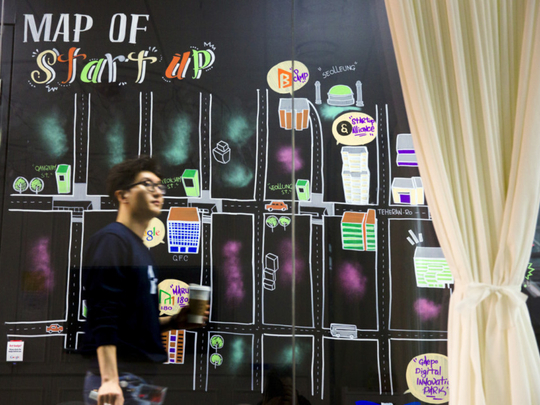
Can you guess which are the two most expensive places to start a business? Well, according to Bloomberg’s 2016 Robin Hood Index, the UAE ($2,677) and South Korea ($3,979) come out tops. Compare that to $18 in South Africa and $43 in the UK.
That said, this high setup cost does not seem to have tripped up entrepreneurs in South Korea. StartupKorea currently lists 7,923 startups, spanning every category from big data and IoT to virtual reality and green tech. Some 872 of these were founded less than a year ago. Meanwhile, three South Korean startups currently figure on the industry tracker CB Insights’s list of unicorns — ventures worth over a billion dollars. E-commerce company Coupang leads the way with a valuation of $5 billion, followed by mobile services startup Yello Mobile ($4 billion) and gaming company CJ Games ($1.79 billion).
And yes, technology upstarts have spawned new billionaires in South Korea. Forbes estimates that in 2006, only 18 per cent of Korea’s richest people on its list were self-made entrepreneurs — the rest had inherited their wealth. But fast forward to 2016, and the self-made group now accounts for 40 per cent of the Forbes list.
Startups in South Korea have the unique advantage of tapping into a vast pool of highly-educated resources — the country takes education seriously and spends over 7 per cent of its GDP on it. A fallout is that over 85 per cent of high school graduates enter college.
But the going isn’t always easy. Korean graduates tend to be risk averse and prefer working at conglomerates like Samsung, LG, Hyundai SK Group and Lotte Group — in fact, Samsung represents 17 per cent of Korea’s GDP. Nathan Millard, CEO of the startup-focused communications agency G3 Partners dubs it the “Ajumma factor” — a reference to the stereotypical elderly woman whose standard advice to young Koreans is to “get a nice job in Samsung and a good wife”.
But with the chaebols battling shrinking global markets and intense competition from China, startups are gradually moving from Plan B to Plan A for more job seekers. Besides, it is now easier to become an entrepreneur — the World Bank’s Doing Business project reveals that in 2003, it took 17 days and ten procedures to register a company in South Korea. Last year, it took just four days and three procedures.
The South Korean government is also helping out with its “creative economy” initiative. The Invest Korea website notes that the government has established 17 Centres for Creative Economy and Innovation (CCEI) across the country — their goal is to match local startups with conglomerates, as also provide resources. Apparently, this initiative has helped 800 startups so far, and attracted $120 million in investment.
Meanwhile, government-run incubators like D. Camp, TIPS Town and Maru180 are further nurturing the startup scene. And in May 2015, Google opened its first Asian startup campus in the Gangnam district of Seoul. Apart from providing working spaces, Google will put local startups in touch with experienced entrepreneurs and networks around the world.
Apparently, the future is even brighter. The government plans to spend around $65.9 billion in creating startups, especially around the Pangyo area. It is also making progress with 5-for-1 and even 9-for-1 matching schemes for investment in startups by accredited investors.
According to Invest Korea, currently e-commerce, gaming and food tech are all the rage. Success stories include Coupang, WeMakePrice, Baedal Minjok, Yogiyo and IGA Works. The government is also interested in biotech, and plans to invest around $68 million on startups in this space.
Meanwhile, the ambitious acceleration programme K-Startup Grand Challenge plans to bring 40 foreign startups to Korea. Apart from taking care of flight tickets and living expenses, the government will award up to $133,000 as grant to the best startup of the lot.







